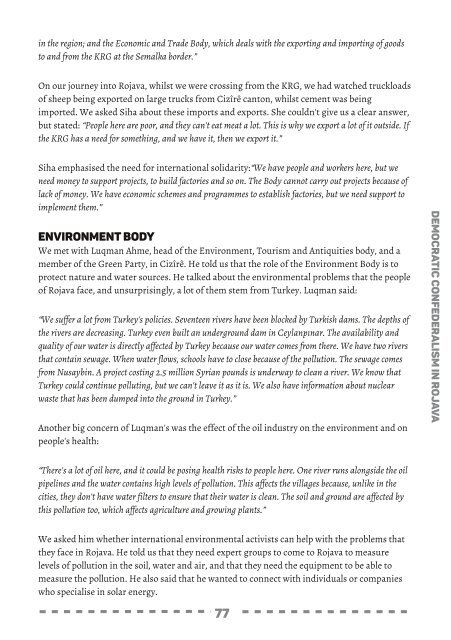STRUGGLES
Struggles-for-autonomy-in-Kurdistan
Struggles-for-autonomy-in-Kurdistan
Create successful ePaper yourself
Turn your PDF publications into a flip-book with our unique Google optimized e-Paper software.
in the region; and the Economic and Trade Body, which deals with the exporting and importing ofgoods<br />
to and from the KRG at the Semalka border.”<br />
On our journey into Rojava, whilst we were crossing from the KRG, we had watched truckloads<br />
ofsheep being exported on large trucks from Cizîrê canton, whilst cement was being<br />
imported. We asked Siha about these imports and exports. She couldn't give us a clear answer,<br />
but stated: “People here are poor, and they can't eat meat a lot. This is why we export a lot ofit outside. If<br />
the KRG has a need for something, and we have it, then we export it.”<br />
Siha emphasised the need for international solidarity:“We have people and workers here, but we<br />
need money to support projects, to build factories and so on. The Body cannot carry out projects because of<br />
lack ofmoney. We have economic schemes and programmes to establish factories, but we need support to<br />
implement them.”<br />
Environment body<br />
We met with Luqman Ahme, head ofthe Environment, Tourism and Antiquities body, and a<br />
member ofthe Green Party, in Cizîrê. He told us that the role ofthe Environment Body is to<br />
protect nature and water sources. He talked about the environmental problems that the people<br />
ofRojava face, and unsurprisingly, a lot ofthem stem from Turkey. Luqman said:<br />
“We suffer a lot from Turkey's policies. Seventeen rivers have been blocked by Turkish dams. The depths of<br />
the rivers are decreasing. Turkey even built an underground dam in Ceylanpınar. The availability and<br />
quality ofour water is directly affected by Turkey because our water comes from there. We have two rivers<br />
that contain sewage. When water flows, schools have to close because ofthe pollution. The sewage comes<br />
from Nusaybin. A project costing 2.5 million Syrian pounds is underway to clean a river. We know that<br />
Turkey could continue polluting, but we can't leave it as it is. We also have information about nuclear<br />
waste that has been dumped into the ground in Turkey.”<br />
Another big concern ofLuqman's was the effect ofthe oil industry on the environment and on<br />
people's health:<br />
democratic confederalism in rojava<br />
“There's a lot ofoil here, and it could be posing health risks to people here. One river runs alongside the oil<br />
pipelines and the water contains high levels ofpollution. This affects the villages because, unlike in the<br />
cities, they don't have water filters to ensure that their water is clean. The soil and ground are affected by<br />
this pollution too, which affects agriculture and growing plants.”<br />
We asked him whether international environmental activists can help with the problems that<br />
they face in Rojava. He told us that they need expert groups to come to Rojava to measure<br />
levels ofpollution in the soil, water and air, and that they need the equipment to be able to<br />
measure the pollution. He also said that he wanted to connect with individuals or companies<br />
who specialise in solar energy.<br />
77


